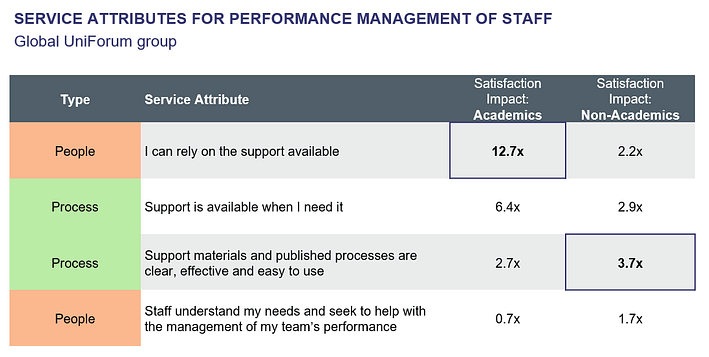The performance management of staff is an essential activity that is delivered in different ways across different organisations. When it comes to the higher education sector, UniForum data highlights one key trend: universities tend to have narrower spans of control than cross-industry best practice. Although this may not always be a conscious choice, it almost always has consequences. Having a high ratio of managers to staff is not only expensive, but also makes it harder for a manager to become ‘expert’ in an area. It also requires universities to provide increasing amounts of support for managers, whether through written guidance and training, having on-hand support staff or self-serve systems. And with the increasing challenges around change control and fatigue that managers face, this support is crucial.
If having more managers does not necessarily mean better performance management of staff, then what kind of support do managers really value? Responses to the UniForum service effectiveness assessment allow us to understand the drivers of satisfaction for activities such as support for performance managing staff. The ‘satisfaction impact’ scores of individual activity attributes can help universities to understand where to begin when it comes to improving staff satisfaction: whether having access to an efficient system, clear and effective processes being in place, or receiving support from people who understand needs and show an interest, the ‘satisfaction impact’ scores of individual activity attributes can help universities to understand where to begin when it comes to improving staff satisfaction.

For the management of staff performance, what ‘matters most’ differs between academic and administrative managers. For professional staff, the attributes with the highest satisfaction impact scores are focused on process; in particular having ‘clear, effective and easy to use materials’ has an impact score of 3.7x. We also see this reflected in survey free-text comments, with universities performing well in this area praising the helpful ‘tools’ and ‘PDR systems’ that support them, and those less satisfied highlighting that they are unhappy with having ‘no formal processes in place’. Examples of effective tools and processes include self-service detailed guidance that managers can access (and, just as important, are aware they can access), as well as having the systems in place to notify them when management tasks need to be completed and allow them to record information easily e.g. performance reviews or workload planning.
Academics, on the other hand, care more about having ‘reliable support’; this has a massive 12.7x impact on satisfaction. Universities with high satisfaction scores in this area praise the staff providing guidance being ‘supportive and helpful’, and for universities with low satisfaction, academics complain about being unable to get ‘clear advice’. What does this mean in practice? Well, as an example, academics require on-hand support with tools and systems from staff when requested, as well as support overseeing the process as a whole and prompts to complete tasks when required.
These two differing priorities are a great example of where a one-size-fits-all approach is not always the best way to go. Should universities invest training effort to ensure academics become more self-sufficient, or do they provide more HR personnel to support their staff performance management needs? Or is it simply the case that clearly communicating the service standards to expect will be the best way of driving satisfaction? UniForum’s Service Effectiveness data can provide the evidence needed to back different strategies and investment opportunities. And ultimately, greatly increase the chances of improving staff satisfaction in an efficient and effective way.
This article was jointly written by Phil Copestake, Managing Director – UK & Europe and Ines Beveridge, Senior Business Analyst.
